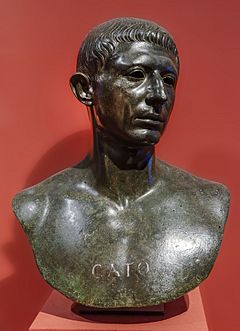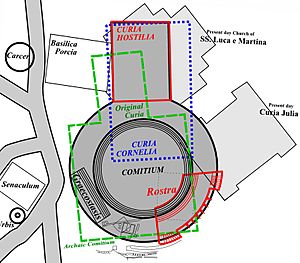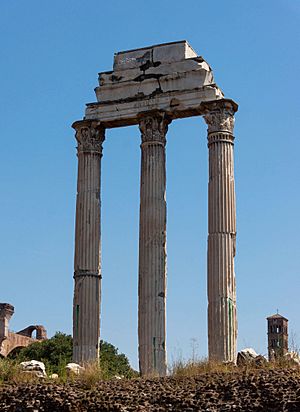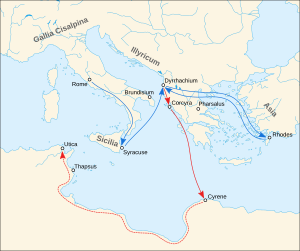Cato the Younger facts for kids
Quick facts for kids
Cato the Younger
|
|
|---|---|

Inscribed bronze bust from Volubilis
|
|
| Born | 95 BC |
| Died | April 46 BC (aged 49) Utica, Africa, Roman Republic
|
| Nationality | Roman |
| Occupation | Politician |
| Known for | Opposition to Julius Caesar |
| Office |
|
| Spouse(s) |
|
| Children |
|
| Parents |
|
| Relatives |
|
| Family | gens Porcia |
| Military career | |
| Allegiance |
|
| Rank | Praetor |
| Wars | |
Marcus Porcius Cato, often called Cato the Younger, was an important Roman senator. He lived from 95 BC to April 46 BC. He was known for his strong beliefs and for trying to keep old Roman traditions alive. Cato was a great speaker and followed a philosophy called Stoicism. He was very honest and respected traditions. This made him popular, and he used his influence against powerful generals like Julius Caesar and Pompey.
Before the civil war started, Cato held several political jobs. As a quaestor (a finance official) in 63 BC, he was praised for being honest. He helped manage Rome's money fairly. As a tribune in 62 BC, he passed laws to help poor citizens get grain. He also tried to make generals give up their armies before running for elections. He often disagreed with Caesar's plans during Caesar's first time as consul in 59 BC.
Cato supported Pompey in 52 BC to try and separate him from Caesar. This plan worked. Cato and his friends pushed for a strong stand against Caesar. Even though Cato probably didn't want a civil war, his actions helped cause the war in 49 BC. During the war, he joined Pompey. After Pompey was defeated and Cato's side lost in Africa, he chose to end his own life. He did not want to ask Caesar for forgiveness. This made him a symbol of the Roman Republic.
Cato's influence came from his strong moral beliefs. He represented old Roman traditions that appealed to many people. Some people, both then and now, criticized him for being too stubborn. His actions sometimes made things worse, leading to the First Triumvirate and the civil war. He is called "the Younger" to tell him apart from his great-grandfather, Cato the Elder, who was also known for his traditional values.
Contents
Early Life and Family
Cato was born in 95 BC. His father was also named Marcus Porcius Cato, and his mother was Livia. He was a descendant of Cato the Elder, a famous Roman who was known for his strict and traditional ways.
Cato and his sister Porcia became orphans when he was very young. They were raised by their uncle, Marcus Livius Drusus. After their uncle died, Cato and his sister likely moved in with their mother's older brother. Cato was especially close to his half-brother, Gnaeus Servilius Caepio, and his older half-sister, Servilia. Servilia later married Marcus Junius Brutus (the father of the famous Brutus).
Stories from Cato's childhood often show that his strong character was clear from a young age. Around age 16, Cato joined a group of priests called the quindecimviri sacris faciundis. This was a great honor. It helped him connect with powerful senators.
Becoming a Politician
After joining the priests, Cato received his inheritance. This made him a wealthy citizen, though he was still modest compared to other rich Romans. Around this time, he began to study Stoicism, a philosophy that taught self-control and living in harmony with nature. He also studied other philosophies.
Living by Old Roman Ways
Cato began to live in a very traditional way. He adopted a simple lifestyle. He preferred to walk long distances instead of riding a horse. He sometimes walked barefoot in the city and wore only a toga, without a tunic underneath. These choices were inspired by statues of Rome's ancient heroes. He wanted to show that he respected the old Roman customs.

Cato's first public act was to oppose changes to the Basilica Porcia. This was a public building built by his great-grandfather. Some officials wanted to move a column that blocked their view of the Roman Forum. Cato saw this as a chance to defend his family's honor and show his respect for tradition. Public buildings were important family symbols.
Marriages and Alliances
Cato married Atilia, the daughter of a man named Atilius Serranus. With her, he had a son, Marcus Porcius Cato, and a daughter, Porcia. He also arranged a good marriage for his sister. These marriages helped him build a network of political allies.
Military Service
In 72 BC, Cato volunteered to fight in the Third Servile War against Spartacus. He showed great courage. Even though his army lost some battles, Cato was recognized for his bravery. He refused awards, saying his standards for military success were higher.
A few years later, in 67 BC, he became a military tribune. He was sent to Macedonia. There, he earned the respect of his soldiers by sharing their hardships and treating them fairly. He continued his habit of walking everywhere instead of riding a horse.
While in Macedonia, he learned that his beloved half-brother Caepio was dying. Cato rushed to see him but arrived too late. He was overcome with sadness and spent a lot of money on a grand funeral for his brother. After his military service, he traveled through Asia Minor. He also visited Pompey, a powerful general.
Starting in Politics
Cato returned to Rome in 65 BC. He planned to run for quaestor later that year. He spent a lot of time learning about the laws for this job, which involved managing state money. He was easily elected and started his term in December 65 BC.
Around this time, Lucullus, a very rich Roman general, wanted to marry Cato's younger half-sister, Servilia. This was likely a way for Lucullus to gain allies. Cato agreed to the marriage. During his time as quaestor, Cato helped Lucullus get a military parade (a triumph) in 63 BC.
Quaestorship (63 BC)
Cato was assigned to the state treasury in Rome. At that time, corruption was common in the treasury. Cato began his term by investigating and firing corrupt clerks. He also worked to collect old state debts and pay government creditors on time.
He worked with Julius Caesar to challenge payments given to people who had killed others during a past period of violence. Cato also made sure that fake documents were rejected by the treasury. On his last day in office, he found a friend entering false records and erased them. He also spent a lot of money to copy all treasury records. This was to help future officials catch wrongdoers.
Cato became famous for his honesty as quaestor. People said he made the quaestorship as respected as the consulship.
Tribunate (62 BC)
In 63 BC, Cato ran for tribune for the year 62 BC. He won the election. Before his term began, he opposed giving more honors to Pompey. He also took part in a famous debate about the Catilinarian conspiracy.
The Catiline Conspiracy
A noble named Catiline led a rebellion against Rome. He raised an army. When a plot to attack officials in Rome was discovered, Cicero, who was consul, arrested the conspirators. Cicero suggested executing them without a trial. This was usually against the rights of Roman citizens.
Julius Caesar, who was about to become a praetor, suggested imprisoning the conspirators instead. His idea started to gain support. Cato spoke after Caesar. He argued that the Senate was being too soft on enemies of the state. He said that ancient Roman traditions demanded strong action against traitors. Cato's speech encouraged the senators to vote for the death penalty.
Cato and his allies also tried to connect Caesar to the conspiracy. They wanted to harm Caesar's career. This showed the strong political rivalry between Cato and Caesar.
As Tribune

Cato's first action as tribune was to propose a law to expand the grain dole. This law more than doubled the number of people receiving subsidized grain. It put a large cost on the government. But it helped calm unrest in the city.
Another tribune, Metellus Nepos, proposed two bills to honor Pompey. One would give Pompey command of the army fighting Catiline. The other would let Pompey run for consul without being in Rome. Cato strongly opposed both bills. He even physically stopped Nepos from reading the bill in the Forum. A fight broke out. The Senate then passed an emergency decree. Nepos fled Rome.
Cato also helped pass a law that punished military commanders who lied about the number of enemies or Roman soldiers killed in battles. This law might have been aimed at Caesar. Another law required candidates to declare their candidacy in person in Rome. This would force generals to choose between their military command and running for office. This law might have been aimed at Pompey or Caesar.
Becoming a Senate Leader
Cato became important in the Senate during a time of change. Many older senatorial families had been weakened by wars. His old-fashioned ways helped him gain influence. He seemed like a living example of ancient Roman values. Disagreeing with Cato felt like rejecting Roman tradition itself.
His family background also helped him gain respect among the elite. Cato's strong beliefs made him a difficult ally. He rarely compromised. By the end of his time as tribune, he was very popular among the Roman nobles. He helped unite the Senate against Caesar. His success pushed Caesar to find new ways to gain political power.
Before the Civil War
After his tribunate, Caesar left for Spain and Pompey returned to Rome. Pompey wanted to marry one of Cato's nieces. This showed that Cato was seen as a major political player. But Cato refused the offer. He did not want to limit his freedom to act as he thought best in politics.
By refusing Pompey, Cato created a division between Pompey and the Senate. This was likely a mistake. Pompey then had to find other allies to help his retired soldiers get land and to approve his actions in the East. Cato also used delaying tactics to oppose a plan by Marcus Licinius Crassus to help tax collectors. Cato's actions forced Pompey and Crassus to seek new alliances.
When Caesar returned from Spain in 60 BC, he had to choose between entering Rome to run for consul or keeping his military command for a triumph. Caesar asked the Senate for special permission to run for consul while still outside the city. Cato used delaying tactics to block this request. So, Caesar gave up his triumph to run for consul. Cato and his allies tried to make Caesar's consulship unimportant. They also helped Cato's son-in-law, Marcus Calpurnius Bibulus, get elected as Caesar's co-consul. In the end, both Caesar and Bibulus were elected for 59 BC.
Cato's strong opposition pushed Caesar to form an unusual alliance with Pompey and Crassus. This alliance is known today as the First Triumvirate. Caesar would help Pompey and Crassus, who were rivals, work together.
Caesar's Consulship (59 BC)
Caesar's year as consul began with a bill to give public lands to poor citizens and Pompey's soldiers. Cato tried to delay the bill by talking for a long time. Caesar had him briefly arrested. Caesar then decided to bring the bill directly to the people.
Bibulus, Cato's co-consul, tried to stop the bill by declaring bad religious omens. But he and Cato were attacked in the street. The bill then passed. Senators were required to swear to uphold the new law. Cato and an ally refused at first, but later took the oath.
With Bibulus staying home, Caesar quickly passed more laws. These included recognizing the Egyptian king, approving Pompey's actions in the East, and helping tax farmers. Cato and his allies continued to resist these bills but were unsuccessful. Cato also opposed the law that gave Caesar control of provinces in Gaul for five years.
Cato did support one of Caesar's bills, which aimed to prevent corruption by provincial governors. This showed that Cato's opposition was mainly against bills that would benefit Caesar personally. Throughout Caesar's consulship, Cato and his allies spread the idea that Caesar and his allies were becoming tyrants. This campaign was successful in making people wary of Caesar's actions.
Cyprus (58 BC)
After Caesar's consulship, his opponents tried to question the legality of his laws. A tribune named Publius Clodius Pulcher was elected in 58 BC. Clodius proposed a bill to annex the island of Cyprus. He then proposed that Cato be appointed to govern Cyprus.
Historians have different ideas why Clodius chose Cato. Some think Clodius wanted Cato out of Rome. Others think it was an attempt to form an alliance. Cato accepted the role. He went to Cyprus and managed the annexation. He was very diligent in his work, cataloging and selling the royal possessions. His administration of Cyprus was well-regarded for its honesty. When he returned to Rome, he brought the treasures to the treasury in a grand procession.
Return from Cyprus
By the time Cato returned from Cyprus, Clodius and Pompey had become enemies. Cicero had also returned from exile with Pompey's help. Cato divorced his wife Marcia so she could marry his friend, Quintus Hortensius, to strengthen an alliance.
By 56 BC, the alliance between Caesar, Pompey, and Crassus was falling apart. Pompey was being attacked by both Cato's conservative allies and Clodius. This forced Pompey to renew his alliance with Caesar and Crassus. They met at the Luca Conference. Caesar would help Pompey control Clodius. Pompey and Crassus would become consuls and receive important military commands. Caesar would also get his command in Gaul extended.
In 55 BC, Pompey and Crassus were elected consuls. Cato ran for praetor against Publius Vatinius. Pompey interrupted the elections to ensure Vatinius won. Cato also tried to stop a law that would give Crassus the province of Syria for a war against the Parthian Empire. Cato used delaying tactics again, but he was arrested. His attendance was later blocked by armed groups.
Praetorship (54 BC)
The elections for 54 BC were a victory for Cato and his allies. Cato was elected as a praetor and was put in charge of the extortion court. Opponents of Caesar's allies brought many lawsuits, but most were acquitted.
One case was against Aulus Gabinius, who was convicted of taking a large bribe. Gabinius was forced into exile. This was the only successful prosecution against Caesar's supporters. Cato also tried to pass laws to stop bribery in elections. But the bill was unpopular because citizens benefited from payments from wealthy senators.
Cato also reacted strongly to Caesar's victories in Gaul. When he heard that Caesar had attacked during a truce and killed many Germans, Cato was angry. He believed Caesar had violated international law. He even suggested that Caesar be handed over to the survivors as punishment.
The year 54 BC also saw a big scandal involving bribery in elections. Two consuls, a supporter of Caesar, and an opponent of Caesar tried to pool money to bribe voters. When the plot was revealed, they were all charged. This led to delays in elections.
Political Chaos
Repeated delays prevented elections for 53 BC. Some people wanted Pompey to become a dictator. Cato and other senators strongly opposed this. Cato praised Pompey for refusing a possible dictatorship. This led to a brief period of stability. Two conservative consuls were elected in July 53 BC. They tried to pass a law requiring a five-year delay between holding a magistracy and governing a province. This would make it harder for consuls to choose their own provinces and borrow money. Cato likely supported this, but it was defeated.
Caesar's daughter, Julia, who was married to Pompey, had died the previous year. But Pompey still supported Caesar. News arrived that Crassus had been defeated and killed by the Parthians in Syria. This made a conflict between Caesar and Pompey seem more likely.
The year 52 BC was filled with political violence between rival gangs led by Clodius and Titus Annius Milo. Clodius was murdered. The violence increased, and the Senate house was burned down.
Pompey's Sole Consulship (52 BC)
With Rome in chaos, Cato and Bibulus proposed making Pompey the sole consul. This was a way to restore order without giving Pompey unlimited power as a dictator.
Pompey's sole consulship was a turning point. He held a trial for Milo, who was charged with public disorder. Cato was one of the jurors. Milo was found guilty, even with Cicero defending him. However, Cato did not fully bring Pompey to his side. Pompey supported a law that allowed Caesar to run for consul without being in Rome.
Cato then ran for consul for 51 BC. He said he was doing it out of public duty to defend the Republic from Caesar and Pompey. He ran a very simple campaign, refusing to give out money or favors. He lost the election. After this defeat, Cato did not run for consul again.
Caesar's Civil War

Cato's actions had pushed Caesar into a difficult position. From 52 BC onwards, Cato and Pompey's friends tried to separate Pompey from Caesar. Pompey eventually decided that his power could not exist alongside Caesar's growing influence. Cato continued to oppose Caesar and spread the idea that Caesar was becoming a tyrant. This view became common among senators by 51 BC. However, events began to move beyond Cato's control. His allies were willing to do anything to stop Caesar.
Attempts to recall Caesar from Gaul began in 51 BC. They argued that Caesar's job was done and he should return home with his army. Caesar's allies in the tribunate blocked these attempts. In 50 BC, the Senate seriously discussed ending Caesar's command. Caesar tried to gain new allies with favors.
One of Caesar's allies, Gaius Scribonius Curio, cleverly suggested that both Caesar and Pompey should give up their commands at the same time. Cato reportedly said this was a plot by Caesar. However, most senators liked the idea. They thought mutual disarmament would reduce tensions and prevent civil war. The majority of the Senate (370 to 22) accepted Curio's compromise. Cato's vote is not recorded, but most historians believe he voted against it.
Cato's years of speaking out against Caesar had created a strong anti-Caesar policy among younger senators. They hoped a united Senate would force Caesar to back down. By early January 49 BC, Cato, Pompey, and their allies were unwilling to make any compromises. Cato kept pushing Pompey to stand firm. On January 7, 49 BC, the Senate passed an emergency decree against Caesar.
Fleeing Italy
Caesar did not back down. He crossed the Rubicon River with his army, which surprised Cato. Cato was saddened by the consequences of his political strategy. He soon said that peace was worth making concessions. When news of Caesar's fast advance reached Rome, Pompey decided to flee Italy for the eastern provinces.
Caesar offered peace terms. He would give up his command and run for consul in person if he received amnesty and Pompey left for Spain. Cicero said that Cato strongly supported this plan. But hard-liners who wanted to defeat Caesar militarily rejected the peace offers. This showed that Cato had lost control of his allies.
Pompey sent Cato to Sicily to gather men and supplies. This decision might have been political, to keep Cato away from the main fighting. But on April 23, Cato abandoned the island when faced with Caesar's forces. He did not fight, even though he had enough troops to resist.
Greece and Africa
After retreating, Cato joined Pompey in Dyrrhachium. Cato admitted that Cicero's more moderate policy, which suggested compromise with Caesar, would have been better for Rome. Cato was then sent to Asia Minor to organize ships. He convinced Rhodes to support Pompey. He left his family there before returning to Pompey in Greece. Cato was not present at the Battle of Pharsalus, where Pompey was defeated. He had opposed Pompey chasing Caesar after a previous battle.
After Pompey's defeat, Cato went to Corcyra. He then sailed to Egypt via Cyrene. When he learned of Pompey's death, he joined Metellus Scipio in Africa. He helped reconcile different factions and put Metellus Scipio in command. Cato believed Metellus Scipio had the right background to inspire the soldiers.
Final Campaign and Death
Cato was given command of the city of Utica. He convinced Metellus Scipio to spare the town's people when they tried to switch sides to Caesar. Cato improved the city's defenses, raised troops, and gathered supplies. He waited for Caesar's arrival. However, Cato became convinced that Metellus Scipio would not be fair if he won against Caesar.
Cato wanted to wear Caesar down by forcing him to stretch his supply lines. But Metellus Scipio accused Cato of being a coward for not wanting to risk battle. Cato privately believed the war was hopeless. He felt that the Roman Republic, as he knew it, was gone. Metellus Scipio ignored Cato's advice and fought a decisive Battle of Thapsus, where his forces were destroyed.
Cato, who was in Utica, received news of the defeat three days later. The city panicked. Cato helped any Roman citizens who wanted to flee. He also sent his family and allies to seek pardon from Caesar. Cato himself prepared for death.
After Cato's death, Caesar reportedly said he was sad to have missed the chance to pardon him.
Key Dates
- 95 BC: Born in Rome
- 67 BC: Served as a military tribune in Macedon
- 65 BC: Became a Quaestor in Rome
- 63 BC: Spoke for the death penalty during the Catiline conspiracy
- 62 BC: Served as Tribune of the Plebs; passed the grain dole law
- 60 BC: Forced Caesar to choose between running for consul or having a triumph
- 59 BC: Opposed Caesar's new laws
- 58 BC: Governed Cyprus
- 55 BC: Unsuccessfully ran for praetorship
- 54 BC: Became a Praetor
- 51 BC: Ran (unsuccessfully) for consul
- 49 BC: Caesar crossed the Rubicon and invaded Italy; Cato went with Pompey to Greece
- 48 BC: Pompey was defeated at the Battle of Pharsalus; Cato went to Africa
- 46 BC: Scipio was defeated in the Battle of Thapsus; Cato died in Utica (April)
Family Connections
Cato's Marriages and Children
- Was engaged to Aemilia Lepida, but the engagement was called off.
- First wife: Atilia (they later divorced)
- Daughter: Porcia, who married first Marcus Calpurnius Bibulus, then Marcus Junius Brutus.
- Son: Marcus Porcius Cato, who died in 42 BC.
- Second (and third) wife: Marcia.
Cato's Ancestry from Cato the Elder
- Marcus Porcius Cato (consul 195 BC)
- Marcus Porcius Cato Licinianus (praetor 152 BC)
- Marcus Porcius Cato (consul 118 BC)
- Marcus Porcius Cato (praetor around 92 BC)
- Gaius Porcius Cato (consul 114 BC)
- Marcus Porcius Cato (consul 118 BC)
- Marcus Porcius Cato Salonianus (praetor ? BC)
- Marcus Porcius Cato (plebeian tribune 99 BC)
- Porcia (wife of Domitius Ahenobarbus)
- Marcus Porcius Cato "Uticensis" (praetor 54 BC)
- Marcus Porcius Cato (plebeian tribune 99 BC)
- Marcus Porcius Cato Licinianus (praetor 152 BC)
* Porcia (wife of Brutus) * Marcus Porcius Cato (died 42 BC) All information from .
Cato's Connection to Brutus' Family
|
|||||||||||||||||||||||||||||||||||||||||||||||||||||||||||||||||||||||||||||||||||||||||||||||||||||||||||||||||||||||||||||||||||||||||||||||||||||||||||||||||||||||||||||||||||||||||||||||||||||||||||||||||||||||||||||||||||||||||||||||||||||||||||||||||||||||||||||||||||||||||||||||||||||||||||||||||||||||||||||||||||||||||||||||||||||||||||||||||||||||||||||||||||||||||||||||||||||||||||||||||||||||||||||||||||||||||||||||||||||||||||||||||||||||||||||||||||||||||||||||||||||||||||||||||||||||||||||||||||||||||||||||||||||||||||||||||||||||||||||||||||||||||||||||||||||||||||||||||||||||||||||||||||||||||||||||||||||||||||||||||||||||||||||||||
|
|||||||||||||||||||||||||||||||||||||||||||||||||||||||||||||||||||||||||||||||||||||||||||||||||||||||||||||||||||||||||||||||||||||||||||||||||||||||||||||||||||||||||||||||||||||||||||||||||||||||||||||||||||||||||||||||||||||||||||||||||||||||||||||||||||||||||||||||||||||||||||||||||||||||||||||||||||||||||||||||||||||||||||||||||||||||||||||||||||||||||||||||||||||||||||||||||||||||||||||||||||||||||||||||||||||||||||||||||||||||||||||||||||||||||||||||||||||||||||||||||||||||||||||||||||||||||||||||||||||||||||||||||||||||||||||||||||||||||||||||||||||||||||||||||||||||||||||||||||||||||||||||||||||||||||||||||||||||||||||||||||||||||||||||||
| Notes: | |||||||||||||||||||||||||||||||||||||||||||||||||||||||||||||||||||||||||||||||||||||||||||||||||||||||||||||||||||||||||||||||||||||||||||||||||||||||||||||||||||||||||||||||||||||||||||||||||||||||||||||||||||||||||||||||||||||||||||||||||||||||||||||||||||||||||||||||||||||||||||||||||||||||||||||||||||||||||||||||||||||||||||||||||||||||||||||||||||||||||||||||||||||||||||||||||||||||||||||||||||||||||||||||||||||||||||||||||||||||||||||||||||||||||||||||||||||||||||||||||||||||||||||||||||||||||||||||||||||||||||||||||||||||||||||||||||||||||||||||||||||||||||||||||||||||||||||||||||||||||||||||||||||||||||||||||||||||||||||||||||||||||||||||||
See also
 In Spanish: Catón el Joven para niños
In Spanish: Catón el Joven para niños
 | Misty Copeland |
 | Raven Wilkinson |
 | Debra Austin |
 | Aesha Ash |

